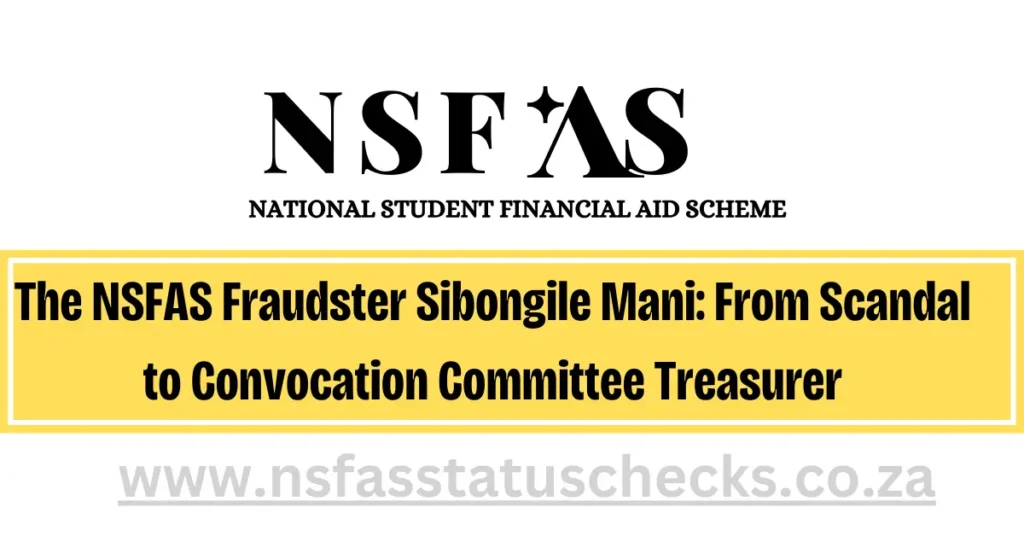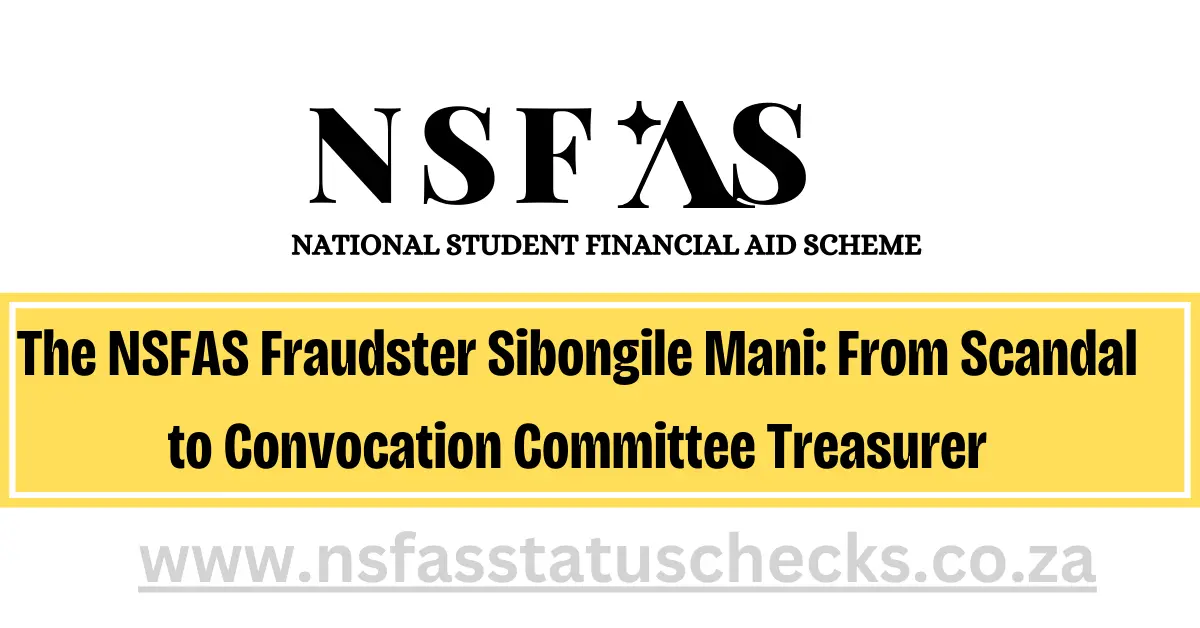In recent news that has sent shockwaves through the academic community, Sibongile Mani, infamous for her involvement in the NSFAS fraud case, has been elected as the treasurer of Walter Sisulu University’s convocation committee. This unexpected turn of events has sparked controversy and raised questions about the university’s decision-making processes and the repercussions it may face.

Background of NSFAS Fraud
Sibongile Mani gained notoriety when she was embroiled in a high-profile case involving fraudulent activities related to the National Student Financial Aid Scheme (NSFAS). The case not only led to legal consequences for Mani but also brought the issue of financial mismanagement in higher education to the forefront.
Walter Sisulu University’s Convocation Committee
The convocation committee plays a crucial role in university governance, representing the voice of alumni and serving as a bridge between the institution and its graduates. The treasurer, in particular, is entrusted with financial responsibilities, making the election process a matter of significant importance.
Controversy Surrounding Sibongile Mani’s Election
The news of Mani’s election as treasurer has not been without its share of controversy. Many members of the public, as well as the university community, have expressed their concerns over the decision to appoint someone with a history of financial misconduct to a position of financial responsibility.
University’s Response
Walter Sisulu University has not remained silent on the matter. University officials have issued statements addressing the controversy, attempting to provide context and assurance to stakeholders. However, the effectiveness of these communications remains a subject of debate.
Impact on Convocation Committee
The fallout from Mani’s election could potentially have severe consequences for the convocation committee itself. Alumni may question the integrity of the committee, leading to a loss of trust in its ability to represent their interests.
Public Perception
Public opinion has been divided, with some expressing outrage at the perceived lack of due diligence in the election process, while others argue that individuals deserve a chance at redemption. Social media platforms have been ablaze with discussions, further complicating the university’s efforts to manage the situation.
Lessons Learned
The incident serves as a stark reminder of the importance of thorough background checks and due diligence in the electoral process. Universities must learn from such experiences to prevent similar controversies in the future.
Transparency in University Elections
To rebuild trust, universities must prioritize transparency in their electoral processes. Clear guidelines, open communication, and involvement of stakeholders can contribute to a more accountable and fair system.
Addressing the Fallout
Walter Sisulu University must take proactive measures to address the fallout from Mani’s election. This includes engaging with the concerned community, addressing grievances, and demonstrating a commitment to rectifying any shortcomings.
Moving Forward
Moving forward, it is imperative for the university to implement strategies that prevent the recurrence of such incidents. This involves not only refining election procedures but also fostering a culture of accountability and responsibility.
Impact on Mani’s Image
Sibongile Mani, already under public scrutiny, now faces additional challenges in managing her image.As for her professional and personal reputation, it remains to be seen what impact her election will have.
Rebuilding Trust
Rebuilding trust within the university community will require a multifaceted approach. Walter Sisulu University must take immediate and transparent action to address the concerns raised by both the public and its stakeholders. Here are some crucial steps to guide the process:
Open Communication Channels
Foster open and honest communication with the university community. Regular updates, town hall meetings, and Q&A sessions can provide a platform for addressing concerns and demonstrating a commitment to transparency. If you are facing some problems and want to contact NSFAS, then complete detailsare given below.
Independent Investigation
Conduct an independent investigation into the election process that led to Sibongile Mani’s appointment. This can help identify any lapses in the system and reassure the community that corrective measures are being taken.
Policy Review and Reform
Evaluate and, if necessary, reform the university’s policies regarding convocation committee elections. This includes reviewing eligibility criteria, nomination processes, and the overall framework to prevent similar controversies in the future.
Collaborative Decision-Making
Involve key stakeholders, including alumni, in decision-making processes related to the convocation committee. This collaborative approach ensures diverse perspectives and helps rebuild trust in the institution’s commitment to inclusivity.
Educational Initiatives
Raising public awareness about ethical election conduct through educational initiatives. Workshops, seminars, and awareness campaigns can contribute to a culture that values integrity and responsible leadership.
Leadership Accountability
Hold leadership accountable for their decisions. If there were lapses in the vetting process or decision-making, acknowledging and taking responsibility is essential for rebuilding trust.
Community Feedback Mechanism
Establish a feedback mechanism for the university community to express concerns and suggestions. This creates a sense of involvement and ensures that the institution remains responsive to the needs and expectations of its members.
Future Elections
Learning from this incident is imperative for Walter Sisulu University to conduct future elections with the utmost integrity. Consider the following guidelines:
Enhanced Vetting Procedures
Strengthen background checks for candidates, especially those applying for positions involving financial responsibilities. This precautionary measure can prevent individuals with a history of financial misconduct from holding such positions.
Clear Election Guidelines
The process of holding elections should be governed by clear, transparent guidelines. This includes outlining criteria for candidacy, detailing the nomination and voting procedures, and ensuring that all stakeholders understand the expectations.
Diverse Representation
Encourage a diverse pool of candidates to run for positions within the convocation committee. As a result, the university community benefits from a wide range of perspectives as well as inclusivity.
Regular Training for Committee Members
Offer regular training sessions for committee members, especially those in key roles such as treasurer. Individuals are equipped with the knowledge and skills to handle their responsibilities ethically this way.
Continuous Improvement
Treat each election as an opportunity for continuous improvement. Regularly evaluate and update election procedures based on feedback and lessons learned from previous experiences.
Conclusion
While the election of Sibongile Mani as treasurer has undoubtedly raised concerns, it also presents an opportunity for Walter Sisulu University to emerge stronger and more accountable. By taking proactive measures to address the fallout, implementing reforms, and learning from this experience, the university can rebuild trust and set a positive precedent for future elections.
FAQs
What specific measures is Walter Sisulu University taking to conduct an independent investigation into the election process?
The university is expected to announce details of the independent investigation, including the scope, timeline, and individuals or entities involved in the process.
How can alumni actively participate in the decision-making processes related to the convocation committee?
The university may introduce platforms or forums where alumni can express their opinions, nominate candidates, and actively engage in discussions about the convocation committee’s functioning.
Are there any plans for educational initiatives regarding ethical conduct in elections at Walter Sisulu University?
The university may launch educational programs, workshops, or campaigns aimed at raising awareness about the importance of ethical conduct in elections and leadership roles.
How does the university ensure the transparency and accountability of future elections?
Details about the university’s plans for enhancing transparency and accountability in future elections are expected to be outlined in forthcoming communications from university officials.
How can the university ensure that diverse candidates are encouraged to run for positions within the convocation committee?
The university may implement outreach programs, communication strategies, and initiatives to encourage candidates from diverse backgrounds to participate in convocation committee elections.
How did Sibongile Mani get elected as the treasurer despite her past involvement in NSFAS fraud?
The election process and criteria for the convocation committee’s treasurer position have raised questions, and the university is expected to provide clarity on the matter.
What measures is Walter Sisulu University taking to address the concerns raised by the public and the university community?
The university has released statements addressing the controversy and is expected to take additional steps to address concerns and rebuild trust.
How can universities ensure transparency in their electoral processes to prevent similar controversies?
Implementing clear guidelines, involving stakeholders, and conducting thorough background checks are essential steps toward ensuring transparency in university elections.
